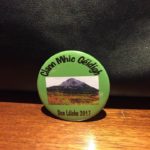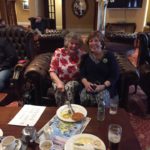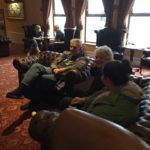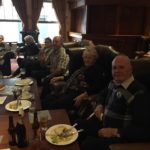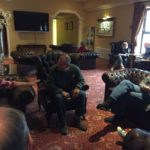The Land They Left Behind Them
Paul J. McGeady – 1991
We are unable to pinpoint the ancestral home of these families (as yet) in Ireland. We suspect that Michael’s family came from Maheraroarty-Glasserchoo area and that John’s family came from Beltany-Cashel-Gatton, both locations within a few miles of the Town of Gortahork in Northwest Donegal.
It was the potato rot and the famine that caused Michael and John to leave Ireland. Their father’s landlord was one Wybrandt Olperts who was not a gentle person, insisting on his rent when there was not rent to be had. Undoubtedly both Michael and John, as was the custom, sent money back to Ireland after they were established in the New World.
They left a bleak, but beautiful, desolate land. Transport in that remote area of mountainous Donegal was by shank’s mare [walking] or horseback for the most part. Communication was mostly by sea. There were no roads fit for wheeled vehicles until 1834. People clung to the coast. Settlement of the area, such as it was, had not begun until their ancestors were driven out of Ulster in the Seventeenth Century.
Many of the dwellings, although stone-built, were simply one room thatched houses occasionally with a built-in bed or beds placed in side walls; but many, if not the majority, slept on straw, rushes, or heather spread in front of the fire. Most homes had no chimney and at best one small window without glass. Farming and grazing and remittances from sons (some as young as 13) working in Ulster or Scotland kept them alive. Rundale and the division of their small plots (with the landlord’s consent) frequently left many sons and daughters with plots too small. [Webster’s Third New International Dictionary defines rundale: a distribution of lands among tenants or owners in Scotland or Ireland by which the land is apportioned so that a single tenant’s or owner’s holding consist of strips lying betwen those of others.] Poverty was rampant. Shoes and clothing were scarce. Poteen (illicit whiskey) was plentiful. Famine was real and immigration to America or Australia seemed to be the only salvation for them and those they left behind.
As strange as it may sound, these Irish of the parishes of Cloughaneely and Gweedore were not an unhappy lot. Certainly, there were spiritual compensations. They stayed close to their church. Even under these poor conditions the Irish of Northwest Donegal retained natural dignity and gaiety. Lord George Hill, the then landlord of Gweedore parish, pays tribute to their “intelligence, civility, generosity and courage” (traits that McGeadys still demonstrate plus a slight aristocratic tinge).
The exodus of the most skilled Irish is exemplified by the quotation from the Irish Folklaw Commission, relative to Beltany township, of various McGeadys and their relations and friends in Gweedore. The Commission says:
There was no trade in the world then but some man of Beltany could try it—the best weavers in the country were there; there were masons, carpenters, coopers, thatchers and every kind of tradesmen you could name in this townland; and after the famine years neither tale nor tidings of them could be found. They all went into strange and distant lands and never returned since. The ruins of their houses were there until the land was divided and they were cleared and fences made of the staves, leaving no trace of them to be seen now.
We shall see that the knowledge of these trades was vital to progress in the New World, especially in the developing township of Mauch Chunk, a place that appeared to serve as a magnet for the Irish of Kilmacrenan Barony of Northwest Donegal which embraced Gweedore and Cloughaneely.
One of the most pleasant sounds in the English language today is to listen to an English-speaking Donegal lass. The “lilt” is musical and uniquely delightful. (As the song says, “You can hear the angels sing.”) The early days of Mauch Chunk were blessed by those sounds emanating from rosy-cheeked lassies. As we shall discover, both Michael and John married Donegal beauties. John before he left and Michael after he arrived in Mauch Chunk.
Michael and John bravely prepared to leave their native soil with heavy hearts, their parents and family mourning. Carrying the final blessing of Father Hugh McFadden, they put their few belongings on their backs. Michael took leave of his brothers and sisters with a promise to “send for them” and set out on foot for Londonderry. John, too, said his goodbyes in the same manner and he, too, took ship for the New World. Their destination: Mauch Chunk, Pennsylvania, where tales of Mauch Chunk as the center of the “Black Gold” or “Black Diamonds” (anthracite trade), with jobs-a-plenty, had reached into their remote fastness via letters to relatives in the parish—off they went to seek their fortune, facing the real perils of the Famine Coffin Ships on which they embarked. The bow of the ship gave them their last glimpse of the Holy Ground. America beckoned them to their new life.
